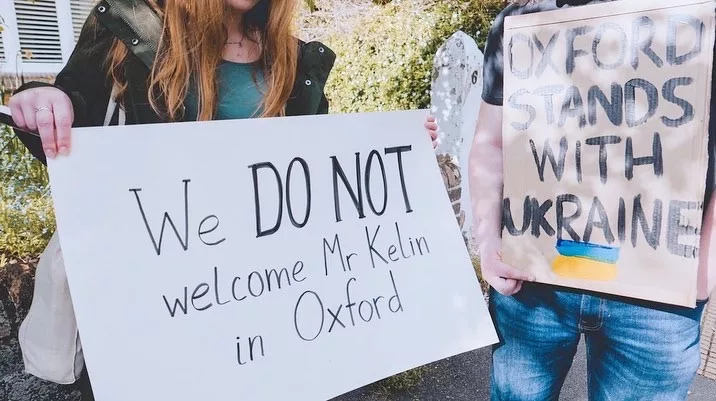Known affectionately among members and fans as ‘Old Document’, Antiquum Documentum was founded in Hilary Term 2022 by Alexander Trowell and Jarek Jankowski whilst sat at a table in the King’s Arms. They were joined shortly thereafter by Daniel Greenway and Iris Oliver and, as conversations in the King’s Arms often go, they observed that Oxford’s niche for ornamented choral polyphony remained bemusingly unfilled. What is ‘polyphony’? I hear you cry. Why is it ‘choral’ and what makes it ‘ornamented’? The group that the five subsequently founded specialises in a distinctive style of singing, which takes the multi-voice music you might hear in your college chapel on a Sunday, and, after intense investigation into the earliest manuscripts of the music to find the most original form of the notes, they essentially sing with frills, adding ululations in certain carefully considered places, and thereby producing a very ancient sound in what are (to choral singers) often familiar pieces. It’s 15th, 16th and 17th century sacred music like you’ve never heard it before! The ‘ornamented’ style of singing declined in the western European church, but remained a significant part of ritual in the church in east Europe, most famously perhaps in Byzantine chant which you might have heard at the Coronation last Saturday. Antiquum Documentum describe themselves as ‘specialising in early sacred vocal music, particularly in historical performance-practice with historical pronunciation, pitch and ornamentation.’ Since the group’s foundation Antiquum Documentum has gained twelve members and performed three successful concerts, although they appear perhaps most proud of their exquisitely detailed posters, which you have probably seen around Oxford. On Tuesday of seventh week last term they performed again in Keble chapel to an audience of around seventy, offering a programme of ten pieces from the Papal Curia (the area of Italy under the jurisdiction of the Papacy), which demonstrated the depth and breadth of talent which the group has fostered over the last year.
The concert began with ‘Improperia’ by Victoria, blossoming out of the silence of the chapel with closely layered harmonies. The tutti (‘all singers’) sections, were beautified by movement in the tenors and altos, and interleaved with solo tenor recitative (‘singing-speaking’), cantored expertly by Jarek Jankowski, then tied cleanly and plaintively with an emphasised ‘responde me’, ‘answer me’. Then followed Josquin DesPrez’s setting of ‘De profundis’, a piece significant in representing the international nature of the Sistine Chapel during the 16th and 17th centuries. The voices rose into sound one after another, mimicking of the vocative theme of the text: ‘Out of the deep have I called unto thee, O Lord; Lord hear my voice’, set low in the ensemble’s registers to create a cavernous quality. The lowest voices, the basses, created rumbling, drone-like lines, which the richly ornamented, Byzantine-sounding tenor lines cut through with higher, plaintive phrases.
This third concert by Antiquum Documentum was set apart from the first two in welcoming Keble’s junior organ scholar Edward Gaut on the chamber organ. Ally explains that the music of their programme is likely to have been accompanied by mellow chamber organ accompaniment, and would have been for certain in the Roman churches under Papal control, other than the Sistine Chapel, notably St Peter’s Basilica. Edward accompanied the sung repertoire and performed two solo pieces by Frescobaldi; ‘Recerdar dopo il credo (Messa della Madonna)’ and ‘Toccata per l’Elevatione (Messa delli Apostoli) later in the programme. Without the pressure-responsiveness of a piano with strings, the piped chamber organ relied on precision and careful articulation to communicate the swelling, emotional phrases of the solo pieces. Edward achieved this to great effect and proved an engaging addition to the choral programme.
Their next piece, Allegri’s setting of Psalm 51 ‘Miserere’, (‘Have pity on me’) is known to have been composed for the Sistine Chapel in 1638 to be sung as part of the liturgy in Holy Week, the week leading up to Easter, which is the most holy week of the Christian year. Allegri’s ‘Miserere’ has a certain mythology attached to it. Making copies of the piece was forbidden, and all original copies could not be removed from the Sistine Chapel, yet it is said that the piece made it into the outside world via pirate copies made by a young Mozart who could simply remember the whole piece. Antiquum Documentum gave a shimmering rendition of this classic, but in its more original form. The version we know today was in fact based on a copying error which transposed the famous solo line up to a top C, and special mention must be made of soprano Lois Heslop for her crystalline performance of this now iconic accident of transmission. Jarek Jankowski returned with remarkable technical skill cantoring alternate verses with bubbling, flowing ornamentation, between beautiful tutti sections, aching with tension.
The group’s next piece, ‘Ave Regina Cælorum’ (‘Behold the queen of Heaven’) by Victoria, provided a satisfying contrast to the yearning Miserere. Antiquum Documentum brought warmth to the piece’s close, concentric harmonies and concluded with a jubilant ‘gaude’, ‘rejoice’, before moving to their sixth item, Palestrina’s ‘Sicut cervus’ (‘Like as the hart’). This more layered piece was characterised by long drawn-out melodies, admirably sustained by the singers, and melisma, single words drawn out over multiple notes, echoed smoothly between the parts.
To conclude the first segment of the concert, the tempo picked up again with Anerio’s ‘Christus factus est’ (‘Christ became obedient’), the Allegro (‘lively’) sections of which were another engaging contrast and demonstrated the group’s careful attention to keeping the programme fresh throughout.
Then followed a short address from Ally on the theme which characterised final pieces of the concert: the Crucifixion. A chant-like plainsong ‘Agnus Dei’ (‘the Lamb of God’) from the Graduale di Tempore (1614) for two voices, was executed cleanly by tenors Ally Trowell and Jarek Jankowski, and the concert concluded with Palestrina’s immense ‘Stabat Mater’ (‘The sorrowful mother was standing’). The text of this final piece describes the immense grief of the Virgin Mary watching her son Jesus perishing on the Cross. The piece opened out into monumental depth with great quasi-Romantic swells, emotively communicating the pity of the Crucifixion through the great feeling with which the singers imbued the text. The lower voices of the group sang with great richness, over which the duet movement of the upper voices moved to great effect. Ornamentation welled up within the texture, setting it well within the programme as the piece drew the motifs of the concert together. Having looked at over a century of repertoire of Roman polyphony, from Josquin in the late 15th century and Allegri in the early 17th, the Stabat Mater ended the concert at a halfway point – the high Renaissance – which acknowledged both the styles that preceded it and the emerging Baroque that would soon sweep Europe.
The concert concluded to rapturous applause, which was very well deserved! Overall Antiquum Documentum created an ethereal, transportive atmosphere, with choral music unlike any other in Oxford. I offer Antiquum Documentum my congratulations for such a successful and professional performance, and look forward to hearing them again on Tuesday of 4th Week (16th May) for Choral Evensong in Latin with music by Tallis, Morley and Weelkes.








